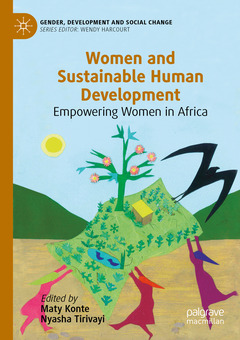Women and Sustainable Human Development, 1st ed. 2020 Empowering Women in Africa Gender, Development and Social Change Series

This book adds significantly to the discourse surrounding the progress made in empowering women in Africa over the last decade, providing strong research evidence on diverse and timely gender issues in varied African countries. Topics covered include climate change and environmental degradation, agriculture and land rights, access to ? and quality of ? education, maternal and reproductive health, unpaid care and women?s labor market participation, financial inclusion and women?s political participation. Cross cutting issues such as migration, masculinities and social norms are also addressed in this volume, which is aimed at policy makers, academics, and indeed anyone else interested in the UN Sustainable Development Goal of the empowerment of women and girls.
Maty Konte is Research Fellow at the United Nations University in the Netherlands (UNU-MERIT) and Vice President of the NGO Women and Nature International in New York City, USA. She has worked with a range of international organisations and African think tanks and is Team Member of INCLUDE, the Knowledge Platform on Inclusive Development Policies. She is also affiliated to the African School of Economics in Cotonou, Benin. Her major interests include policy-relevant research on economic development, gender and institutions.
Nyasha Tirivayi is Research Fellow at the United Nations University in the Netherlands (UNU-MERIT). She has more than 15 years of experience in development research and practice, including working and consulting for UN agencies, international non-governmental organisations and women’s organisations in Africa. She has published research on women’s healthcare, HIV/AIDS, social protection and agricultural innovation.
Date de parution : 08-2020
Ouvrage de 420 p.
14.8x21 cm
Date de parution : 07-2019
Ouvrage de 420 p.
14.8x21 cm
Thèmes de Women and Sustainable Human Development :
Mots-clés :
Climate Change; Meningitis; Health Education; Human Capital; Agricultural Productivity; Tenure Security; Maternal Health Care; Disability; Unpaid Care Work; Gender Inequality; Informal Employment; Sustainable Development; Rural-Urban Migration; Child Obesity; Patriarchy; Contraception; Corruption; Political Economy



